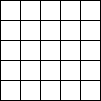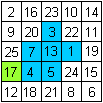|
What is a Magic 3x3 Square?
..............8....1....6.........................
..............3....5....7.........................
..............4....9....2......................... |
You can assemble the numbers 1 to 9 in a square, so that
the sum of the rows, the columns, and the diagonals is 15.
If you take the numbers 1 to 9, you have the standard
square. |
.............8+c....1+c....6+c..............
.............3+c....5+c....7+c..............
.............4+c....9+c....2+c.............. |
A magic square remains magic, if you change each numbers
by a constant c. You add c on the left. You can also subtract, multiply
or divide. |
You define 4x4-, 5x5-... squares correspondingly.
The Magic 3x3 Square
top
You have 1+2+3+4+5+6+7+8+9=45. In a magic square you
have to add 3 numbers again and again. Therefore the average sum of three
numbers is 45:3=15. The number 15 is called the magic number of
the 3x3 square.
You can also achieve 15, if you add the middle number
5 three times.
You can reduce 15 in a sum of three summands eight times:
15=1+5+9
15=1+6+8
|
15=2+4+9
15=2+5+8
|
15=2+6+7
15=3+4+8
|
15=3+5+7
15=4+5+6
|
The odd numbers 1,3,7, and 9 occur twice in the reductions,
the even numbers 2,4,6,8 three times and the number 5 once.
Therefore you have to place number 5 in the middle of
the magic 3x3 square. The remaining odd numbers have to be in the middles
of a side and the even numbers at the corners.
Under these circumstances there are eight possibilities
building a square:
 All the eight squares change into each other, if you reflect
them at the axes of symmetry. You count symmetric squares only once. Therefore
there is only one magic 3x3 square.
All the eight squares change into each other, if you reflect
them at the axes of symmetry. You count symmetric squares only once. Therefore
there is only one magic 3x3 square.
The Magic 4x4 Squaretop
The magic number is (1+2+...+15+16):4
= 34.
The computer found 86 reductions of 34 to a sum of four
summands with the numbers 1 to 16.
34=01+02+15+16
34=01+03+14+16
34=01+04+13+16
34=01+04+14+15
34=01+05+12+16
34=01+05+13+15
34=01+06+11+16
34=01+06+12+15
34=01+06+13+14
34=01+07+10+16
34=01+07+11+15
34=01+07+12+14
34=01+08+09+16
34=01+08+10+15
34=01+08+11+14
34=01+08+12+13
34=01+09+10+14
34=01+09+11+13 |
34=01+10+11+12
34=02+03+13+16
34=02+03+14+15
34=02+04+12+16
34=02+04+13+15
34=02+05+11+16
34=02+05+12+15
34=02+05+13+14
34=02+06+10+16
34=02+06+11+15
34=02+06+12+14
34=02+07+09+16
34=02+07+10+15
34=02+07+11+14
34=02+07+12+13
34=02+08+09+15
34=02+08+10+14
34=02+08+11+13 |
34=02+09+10+13
34=02+09+11+12
34=03+04+11+16
34=03+04+12+15
34=03+04+13+14
34=03+05+10+16
34=03+05+11+15
34=03+05+12+14
34=03+06+09+16
34=03+06+10+15
34=03+06+11+14
34=03+06+12+13
34=03+07+08+16
34=03+07+09+15
34=03+07+10+14
34=03+07+11+13
34=03+08+09+14
34=03+08+10+13 |
34=03+08+11+12
34=03+09+10+12
34=04+05+09+16
34=04+05+10+15
34=04+05+11+14
34=04+05+12+13
34=04+06+08+16
34=04+06+09+15
34=04+06+10+14
34=04+06+11+13
34=04+07+08+15
34=04+07+09+14
34=04+07+10+13
34=04+07+11+12
34=04+08+09+13
34=04+08+10+12
34=04+09+10+11
34=05+06+07+16 |
34=05+06+08+15
34=05+06+09+14
34=05+06+10+13
34=05+06+11+12
34=05+07+08+14
34=05+07+09+13
34=05+07+10+12
34=05+08+09+12
34=05+08+10+11
34=06+07+08+13
34=06+07+09+12
34=06+07+10+11
34=06+08+09+11
34=07+08+09+10
.
.
.
. |
The summands 1 to 16 are distributed regularly in the reductions:
Summand:
Number: |
01
19 |
02
20 |
03
21 |
04
22 |
05
22 |
06
23 |
07
23 |
08
22 |
09
22 |
10
23 |
11
23 |
12
22 |
13
22 |
14
21 |
15
20 |
16
19 |
Unlike the 3x3 square there is not just one conclusion for
the distribution of the numbers 1 to 16 in a 4x4 square.
Fact: There are 880 magic squares,
counting the symmetric ones only once.
This is one of 880 possible squares:
............12....06....15.....01............
............13....03....10.....08............
............02....16....05.....11............
............07....09....04.....14............ |
This square is special. The number 34 is not only the
sum of the numbers in the rows, the columns, and both diagonals, but also
in every 2x2 square. |
The Magic 5x5 Square
top
The magic number is (1+2+...+24+25) : 5 = 65.
Reductions of the magic number 65.
65 = 01+02+13+24+25
65 = 01+02+14+23+25
65 = ...
65 = ... |
65 = ...
65 = ...
65 = 10+12+13+14+16
65 = 11+12+13+14+15 |
The computer found 1394 reductions of the number 65. |
The summands and their number in the sums
You notice, that the middle number 13 = 65:5 appears most
frequently. The numbers of the summands to smaller and bigger summands
drop symmetrically to both sides.
Fact: There are 275 305 224 magic 5x5 squares.
(Scientific American 1/1976)
Making of a magic 5x5-square:
You go through the numbers 1 to 25. There are two rules
for constructing a magic square "top right" and "if the place is occupied,
go one down".
..................... .................... .................... |
Number 1 is placed in the
centre of the first row.
Number 2 follows top right.
But then you leave the 5x5 square.
 Therefore you must imagine the square is a cylinder. The
cylinder has the vertical square sides of the square as circumference.
The horizontal sides touch each other and close the curved surface of the
cylinder. So there is a field top right for number 2. If you unroll the
cylinder, number 2 has gone to the last row one place to the right.
Therefore you must imagine the square is a cylinder. The
cylinder has the vertical square sides of the square as circumference.
The horizontal sides touch each other and close the curved surface of the
cylinder. So there is a field top right for number 2. If you unroll the
cylinder, number 2 has gone to the last row one place to the right. |
Number 3 follows top right.
... ... ... |
Number 4 would lie outside
the 5x5 square. So again you imagine the square would become a cylinder,
this time with vertical axis. You can find a place for number 4. If you
unroll the cylinder, you find the number in the third row on the far left. |
Number 5 lies top right.
You use the second rule for number 6.
If the field top right is occupied, you put the number one row down in
the same column.
You go further on with 7,
8,
and so on. - You use the same rule for number 16
as for number 6.
You can transfer this way of
formation to all magic squares with odd numbers of the sides ;-).
There are also rules for magic squares with an even side
length. They are more complicated however.
The Magic nxn Squareetop
The existence of magic squares nxn is proved for all
numbers n>2. But there is no general rule.
The magic number is (1 + 2 + 3 + ... + n²) : n =0.5
* (n²+1) * n.
The magic numbers of the standard
squares:
Magic squares: 3x3
4x4 5x5 6x6
7x7 8x8 9x9
10x10
Magic numbers: 15
34 65 111
175 260 369
505
Curiosities top
... |
Once again: A square is magic, if the numbers
have the same sum in the rows, the columns and the diagonals. |
... ... ...
|
A square is semi-magic, if the numbers have the
same sum only in the rows and the columns. |
... ... ... |
A square is pandiagonal, if it is magic and if
not only the numbers of the main diagonals, but also the broken diagonals
have the same sum. |
... |
This magic square is pandiagonal. |
... ... ... |
You find the complementary square, if you replace
each number n by 17-n. |
The square is self-complemetary, because the new one
is symmetric to the old one. See red axis.
... ... ... |
A square is associative, if it is magic and if
pairs of numbers lying symmetrically to the centre have the same sum. The
sum is 26=5²+1 =n²+1. |
... |
The 3x3 magic square Lo Shu is associative. |
You can fix the kind of the numbers.
... |
A magic square with prime numbers |
... |
A "semi"-magic square of square numbers
All sums going through the centre have the same value.
Source: http://www.mathpages.com/home/kmath417.htm |
The sequence of these special magic
squares is not finished. There are magic squares missing e.g.
>panmagic squares
>magic squares formed by smaller magic squares
>bordered magic squares (Book 2).
There is an explanation for all the different magic squares:
They can be found by computers. A new property means a new query inside
the program.
Simple Variants top

Magic Squares
on the Internet top
English
Craig Knecht (Magic
Square Models)
| Water
Retention Patterns |
... ... ... |
Imagine, the squares are the top of square prisms with
the height given by the numbers. If you pour water in this solid, it stays
in the centre upto the height 17. Then it flows off. The amount of water
is (17-3)+(17-7)+(17-13)+(17-1)+(17-4)+(17-5)=69.
There are nice problems: Biggest amount of water? Seperate
ponds? Island? |
Eric W. Weisstein (MathWorld)
Magic
Square,
Panmagic
Square,
Associative
Magic Square, Lo
Shu
Harvey D. Heinz
Magic Squares,
Magic Stars & Other Patterns
Holger Danielsson
Magic
Squares
Ivars Peterson's MathTrek
More
than Magic Squares
Mark S. Farrar
Magic
Squares
MathPages
Solving
Magic Squares
Robin Moseley
Magic
Flexagon (.pdf-File)
Wikipedia
Magic
square,
Most-perfect
magic square, Water
retention on mathematical surfaces, Associative
magic square
German
Feng-Shui-Homepage
Das magische Quadrat Lo-Shu
Gerd Müller
Magisches
Quadrat interaktiv
Hans-Peter Gramatke
Magische
Quadrate
Holger Danielsson
Magische Quadrate
Jan Haase
Das
Hexeneinmaleins aus Goethes "Faust" (Lösung)
Jan Theofel und Martin Trautmann
Magische
Quadrate und Würfel
Maria Koth
Magische
Quadrate (.pdf.-Datei)
Paul Heimbach
Magische Quadrate
recordholders.org
Das
größte Magische Quadrat der Welt
Udo Hebisch (Mathematisches Café)
Magische
Quadrate
Wikipedia
Magisches
Quadrat, Vollkommen
perfektes magisches Quadrat
References top
(1) Bild der Wissenschaften, Heft 8/1966, Heft
6/1968, Heft 10/1976
(2) Pieter van Delft /Jack Botermans: Denkspiele
der Welt, München 1980 (1998 neu aufgelegt)
(3) Maximilian Miller, Gelöste und ungelöste
mathematische Probleme, Leipzig 1982
Feedback: Email address on my main page
This
page is also available in German
with more details.
URL of
my Homepage:
https://www.mathematische-basteleien.de/
©
2000 Jürgen Köller
top |


 ....................
....................
 ...
...
 ...
... ...
... ...
... ...
...
 ...
...